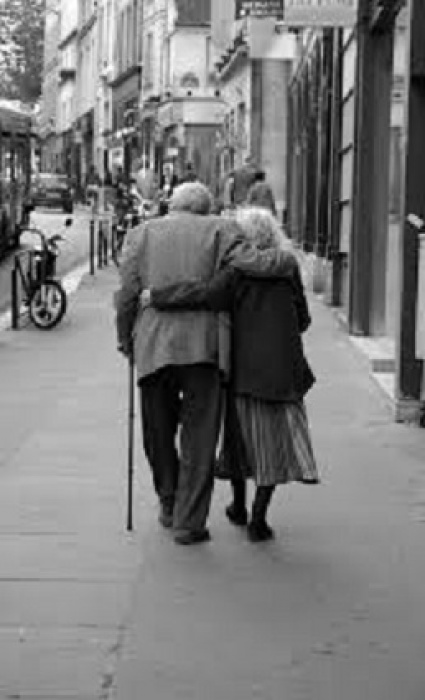August 16, 2016
Aging: Inevitable, but can we manage it better?

As a young boy growing up in Egypt, I was taught that when wishing someone a happy birthday I should add, "I pray you celebrate your 100th." I suppose Egyptians figured out that 100 years is more than enough time for anyone to live. And indeed, that still holds true today for most of the world.
dI also learned young what the Qur’an teaches about old age, especially the natural inevitables of advancing years: white hair, loss of fertility and virility, weaker body and muscles, brittle bones, and loss of memory.
All of these symptoms are accompanied by a gradual descent back to a new childhood and infancy, beginning around age 40. I’m 72 and can definitely attest to at least some of these effects.
Turning into a child-like in your old age is no fun. And for sure, no one thinks you’re cute, as they did when you were growing toward your prime instead of in the opposite direction!
Science has confirmed all of the above signs of aging, especially declining brain function – which is most alarming for many, as it’s the brain that manages all the other organs, including their voluntary and non-voluntary operations.
But the good news is that you can keep your brain relatively healthy well into old age and gracefully live all of those “sunset years.”
There are three areas that demand our attention now if we are to keep our brains healthy into extended old age: physical well-being (good diet and exercise); mental well-being (social activities, recreation, learning); spiritual well-being (prayer, meditation, fasting, being charitable, mindfulness).
In The Brain Book, Prof. Ken Ashwell notes that there are guidelines which “should be followed from the beginning of adult life to have the best chance of slowing the aging process,” but these guidelines “can be applied at any age for some benefits” (emphasis mine). That means I still have a chance to improve my odds, even in my 70s.
Ashwell is a professor of neurobiology at the University of New South Wales, Australia. His 350-page book is well-written for both academics and laypeople, with many helpful illustrations. Prof. Richard Restak MD, Clinical Professor of Neurology at George Washington University, School of Medicine and Health Sciences, calls it “a one-stop reference guide for understanding the brain.”
In the section subtitled, “The optimal diet for a healthy brain” Ashwell recommends that readers follow dietary advice given by government health authorities, keep within a Body Mass Index range of 20-25, stop smoking, and drink only a “moderate amount of alcohol.”
I do follow these recommendations and I don't drink, so I hope I score well here.
On the topic of physical exercise and brain health, Ashwell writes: “Regular physical exercise is not only important for controlling weight and avoiding cerebral arterial disease, but also helps maintain the nervous system components that control balance, coordination, and motor routines. Studies have shown that physically active people have less age-related brain shrinking than do inactive people.”
Although I find it difficult to exercise daily, I try.
In explaining the importance of healthy cerebral blood vessels, he warns: “Everyone consuming the excessively energy-rich Western diet risks a serious disease process called atherosclerosis that restricts or completely stops blood flow through arterial vessels throughout the body and in the brain in particular. Large-vessel disease due to atherosclerosis can cause obstruction or rupture of cerebral arteries with a resulting sudden loss of brain function (a stroke), while small-vessel disease can cause a slowly progressive, but relentless loss of cerebral functions (microvascular dementia).”
I scored a C here, with lots of room for improvement.
Ashwell also devotes a section on the importance of sleep for older people. He notes that sleep is an active process that’s essential for brain health and that sleep problems are common to several brain disorders, including Alzheimer’s Disease.
Scientists have found that sleep may help the body conserve energy and nutrients that the immune system needs to protect it from infection.
One should therefore adopt good sleep hygiene by maintaining a schedule, getting regular exercise, relaxing before bedtime, avoiding stimulants like coffee at night, and getting up with the sun, so that your hypothalamus receives its optimal stimulation at the right time of day.
I deserve an A for my sleep routine, because I’ve always kept the Egyptian habit of rising for dawn prayers and taking a mid-day siesta.
In addressing the mental aspects of aging, Ashwell draws on research findings that people with strong social networks are less likely to develop dementia than those who have little interaction with others.
Volunteering for community organizations is an excellent way to improve your contacts and keep mentally alert. Regular social activity also helps to reduce stress and depression.
I can give myself an A here as well.
Finally, on the spiritual aspects of old age, I turn to another source, The Ghost in My Brain, by Dr. Clark Elliott, a computer scientist, Prof. of Artificial Intelligence at DePaul University.
I wholly agree with what he writes here: “Meditation, and to my mind at least, every contemplative practice, has the critical element of relationship. Such states are experienced as a profound unveiling of the relationship of the individual to the rest of the universe, a revealing of the interconnectedness of life, and the world. It is becoming of the moment, and an understanding of how that moment is connected to all other moments both prior and following.”
So this coming Christmas Eve of 2016, I may wish myself a happy 73rd birthday and pray that I live to the magic age of 100. Or not.








